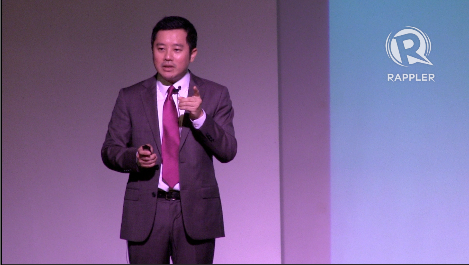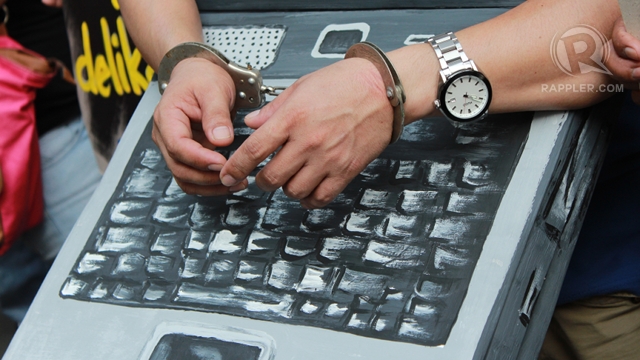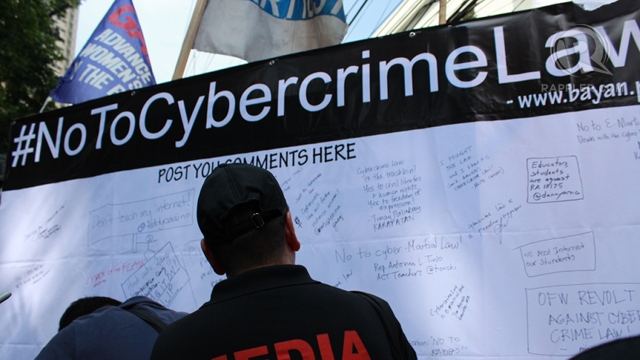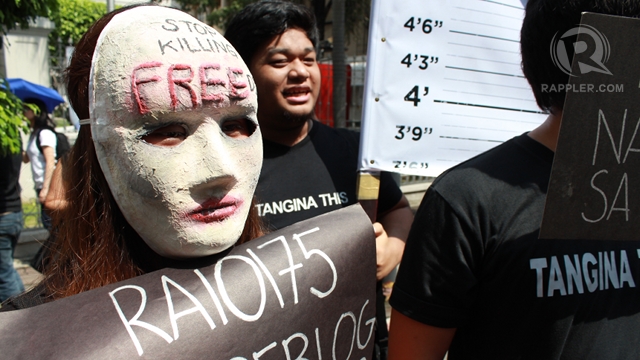SUMMARY
This is AI generated summarization, which may have errors. For context, always refer to the full article.

MANILA, Philippines – A sex scandal video involving a 17-year-old Filipino woman may be the test case of the anti-cybercrime law if it hurdles constitutional questions.
In a forum on the Cybercrime Prevention Act of 2012, Justice Assistant Secretary Geronimo Sy said the Department of Justice received its first complaint related to the law on October 2, the eve of its implementation. The Supreme Court later issued a temporary restraining order (TRO) on Tuesday, October 9.
Sy heads the DOJ’s Office of Cybercrime, which is in charge of implementing the law.
The complaint was e-mailed by a Filipina who Sy said was a victim of child sex pornography when she was 15. Sy said her video was spread “all over the Internet.” Sy did not divulge her name and other details.
Asked if this may be the test case of the new law, Sy said, “Yes and no because the scandal video has been going viral for the past couple of years but the formal complaint now is up although we already know there are some cases already filed against the particular offender in this case.”
Sy told reporters, “This is a new form of cybercrime reporting because it’s an e-mail …. We looked at the data. Initial verification shows it’s a valid complaint for child sex pornography.”
The assistant secretary said that with the law, government can request the hosting sites to remove the video but “because of the nature of cybercrime, there’s a big permanence in how data is being managed online so there is limited things we can do. Here or other countries, it’s the same thing.”
Sy said telecommunication companies and Internet service providers know that hosting child porn is not itself a crime. “But if your attention is called to it, and you don’t do anything about it, then that’s a different set of remedies.”
Asked if government can block the websites, Sy said, “It’s a technical question. It’s the telcos and ISPs who have it. It’s not something the DOJ or NBI can do unilaterally so that’s a misconception we have to clarify.”
“The least we can do for the child is at least not to watch it, that’s the least we can do,” Sy said.
During the forum, Sy sought to assure critics of that the law targets criminals, and not bloggers, and social network users. Various stakeholders from the outsourcing, telecommunications, blogging and media industries were present.
‘TRO a good move’
Globe’s chief legal counsel Rodolfo Salalima, who joined the forum, welcomed the TRO of the Supreme Court.
“It is good because for one, while the intention of the restraining order is temporary, this will give us time to reexamine the law. There are a lot of issues raised against the law, some very basic, fundamental because these issues relate to the Constitution. By way of caution, for the timebeing, this is a good move on their part,” Salalima told reporters.
During the open forum, Salalima expressed concern about online libel, double jeopardy and how to help protect service providers.
Commission on Human Rights Commissioner Cecilia “Coco” Quisumbing also hailed the issuance of a TRO. In the forum, she said criminalizing online libel and imposing a higher penalty for it was a step back for the Philippines’ human rights commitments.
“Considering how much there has been a public outcry about this law and how even members in the House and the Senate are calling for amendments, it is judicious of the judiciary to issue a TRO.”
Quisumbing added, “It is still keeping the door open for discussion, improvement, refinement and further protection. It appears there’s time for sober and objective discussion about improving a law.”
Assurances not convincing
Lawyer Jose Jesus “JJ” Disini, who teaches Cyberspace Law in the UP College of Law, said he was not convinced by the assurances of the justice department that the law is not abusive.
“The problem with this law is it assumes that just because you are using ICT, there is a bigger harm. You can’t assume that. In every case, if the harm is grave, that’s when you assume a higher penalty. You cannot impose a higher penalty across the board that’s why we think it is overly broad in imposing penalty for cybercrimes,” Disini said.
The law imposes a penalty for violations one degree higher than that indicated in the Revised Penal Code.
While the DOJ gave assurances it will observe due process in blocking or restricting access to computer data, Disini said the department cannot be the one to state the law.
“They say the order will just be for 3 days but in the law, that is not stated. It means the rules will change depending on the government. We can trust this government but what happens when there’s another government in power and says it will now be for 6 months? They say there’s a review process but that’s for now.”
Disini added, “We can trust them now but we cannot say what it will be like moving forward.”
Representatives of the outsourcing industry also expressed concern about the penalty clauses and the implications for employers.
Bettina Quimson of the Philippine Software Industry Association voiced this concern.
“The law states that the person who commits the crime, whoever is the employer, if there is [a cybercrime], the employer is also liable. It also states that if they use your premises or that computer, they can actually go in and take that computer and that means it will disrupt our services so what is to stop say a competitor from planting somebody there and we’re shut down?”
Quimson, however, said her group is willing to work with the government in crafting guidelines for the law.
Yet with the TRO, it remains unclear if those guidelines will still be drafted. – Rappler.com
Add a comment
How does this make you feel?



There are no comments yet. Add your comment to start the conversation.